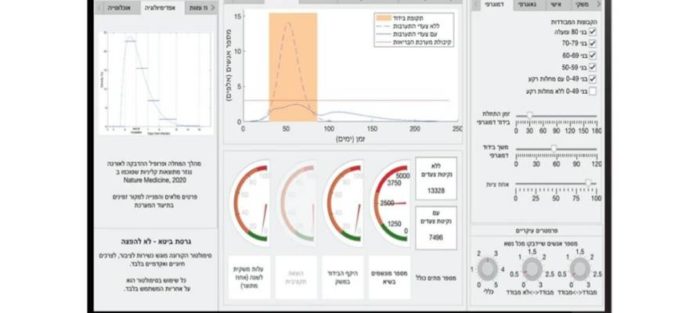Team at Israel’s top technological university develops computerized simulator that uses mathematical models to show how changes in coronavirus policy decisions affect not just the spread of the pandemic, but the economic impact as well.
By Yakir Benzion
A team of technical wizards at Technion-Israel Institute of Technology has developed a computer simulation to assess how the government’s policy decisions will affect the continued spread of the coronavirus in the country.
The simulator uses data from around the world but is being tailored to the Israeli economy, and the team hopes that decision-makers will use it as a tool to explore alternatives to government actions concerning both the health system and the Israeli economy.
The simulator takes various policy measures, such as business closures and health restrictions, as inputs and calculates outcomes, including deceased mortality or the loss of GDP in the economy, in both the short and the long term.
Government officials have expressed interest in the project, which so far has finished the demographic and personal isolation measures sections of the simulator. With Israel easing restrictions and starting to reopen businesses, the team will collect data over the next two weeks on the impact from the business sector and the re-opening of the education system and add that data to the simulator.
When completed, the simulator will allow users to examine the implications of various policy measures on the country, including closures, isolation of certain age groups, partial or full opening of the education system, social distancing, hygiene, the use of facemasks and the opening of Israel to air flights.
Users of the simulator can change a range of variables to predict the outcomes of actions or a combination of actions.
“Various programs for quarantine exit have been presented to the public, some of which are contradictory, but the mathematical models on which they are based have not been presented,” said Prof. Nir Gavish of the Department of Mathematics. “Sharing information on these tools and the data on which they are based will allow for a substantive discussion of quarantine exit plans, and will be fertile ground for the scientific community to contribute to the decision-making process. ”
Health officials have been accused of keeping data to themselves. Team member Prof. Omri Barak said the simulator helps with the issue of transparency.
“The simulator will be available to anyone who wants to use it, enabling the public to understand why certain decisions are not being made. Such a move will deepen public trust, which we consider to be as important a resource as in-patient beds,” Barak said.
The developers said the simulator will not provide a comprehensive answer to all questions, but it will enable decision-makers to explore various options and evaluate them based on solid data.
Gavish said the idea for the simulator came from a math course he teaches, and he blogged about modeling the pandemic. The blog was read by Dr. Gal Alon, who heads the “Civil Cabinet Venture” group of academics and lay people working for solutions to the corona crisis. The group’s goal is to create a toolbox “that will allow users to see complex implications for complex steps.”
Dr. Alon said it is not enough to focus on one aspect only, such as the number of respirators available, because there is a complex system of considerations and implications that the simulator, when completed, will take into account.






